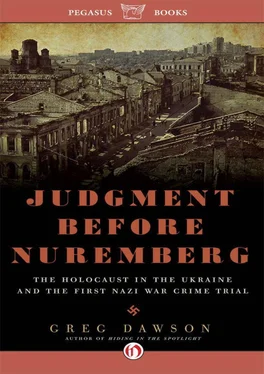The Reichsführer was savoring the fruits of his hard labor in the east to produce a “more humane” path to the goal of a Judenfrei Europe. The greatest attempted coverup in human history had begun.
Madagascar is the title of a 2005 animated movie about New York zoo animals suddenly and unexpectedly transported to the island of Madagascar off the east coast of Africa. Madagascar is also the name of a 1940 Nazi plan to suddenly and unexpectedly transport four million European Jews to the same island. The movie is much more believable—and entertaining—than the Nazi fantasy, which never got beyond what in Hollywood is called the development stage.
But the fact that the cockamamie Madagascar plan was mulled, albeit briefly, as a viable option speaks volumes about the pathology of the Nazi neuroses which found their full and inevitable expression in the slaughter of the Jews, who were transported no farther than Auschwitz, if they weren’t killed in their own back yards in Ukraine.
I ran across the Madagascar plan in reading about lebensraum, the additional “living space”—i.e., other people’s land—Hitler deemed necessary for expansion of Germany, which he believed could not achieve its true destiny within its ample existing borders. Of course, it wasn’t enough to take other people’s land, the people themselves must be removed to make room— lebensraum —for German colonists. There were only two ways to do this: kill them or relocate them.
Enter Adolf Eichmann, former traveling salesman for the Vacuum Oil Company, who bumbled his way up the byzantine Nazi hierarchy to become the logisticsfuhrer responsible for relocating millions of Jews inconveniently occupying the Germans’ new living space. Raul Hilberg said the Holocaust advanced inexorably from expulsion to concentration to extermination. Eichmann was a participant in all three stages, beginning in 1938 when he engineered the “forced emigration” of 150,000 Jews from Austria. Eichmann, who insisted he had nothing against the Jews “personally,” even visited Palestine before the war to study the possibility of Jewish emigration out of Nazi Germany.
Eichmann was a relentless careerist with a taste for harebrained schemes that he thought might pretty up his resume. In 1939, he and his Vienna superior, Brigadefuhrer Franz Stahlecker, hatched the idea of carving a Jewish protectorate out of Polish territory newly occupied by the Germans. They found an area near the Russian border, and a few thousand Jews, mostly from Austria, were hustled into a place with few buildings and little drinkable water. The idea rapidly dissolved in chaos, incompetence, and bureaucratic in-fighting.
The spectacular failure of the so-called “Nisko” project did not cure Eichmann of his weakness for dubious ventures with a high degree of improbability. So when the Madagascar plan landed in his to-do box in the summer of 1940 with the imprimatur of his boss, Reinhard Heydrich, Eichmann not only embraced the chimerical notion, he would later attempt to claim authorship. I believe that Hannah Arendt, in Eichmann in Jerusalem , her psychoanalytical account of Eichmann’s 1961 trial, got it right. “The Madagascar plan was always meant to serve as a cloak under which preparations for the physical extermination of all the Jews of Western Europe could be carried forward.”
Arendt, of course, was writing in the dark ages of Holocaust research before the discovery of Nazi files showing that the Madagascar plan was not a fig leaf, but rather an actual—if utterly fantastic—plan. Though she may have been factually wrong, Arendt’s psychological insight was inadvertently acute: Madagascar was hatched by minds not in full touch with reality.
“That anybody except Eichmann and some other lesser luminaries ever took the whole thing seriously seems unlikely, for—apart from the fact that the territory was known to be unsuitable, not to mention the fact that it was, after all, a French possession—the plan would have required shipping space for four million in the midst of a war and at a moment when the British Navy was in control of the Atlantic,” [1] Hannah Arendt, Eichmann in Jerusalem: A Report on the Banality of Evil (Viking Press, New York, 1963), 76–77.
Arendt wrote.
One truism I discovered about the Holocaust is that what “seems unlikely” often is true. The idea that soldiers from the country of Bach and Beethoven and Brahms were moving across Ukraine in 1941 slaughtering Jews seemed unlikely to my grandfather, who apprehended his misjudgment only when his family was marching to the killing field at Drobitsky Yar. Unlikely as it seems, Madagascar was taken seriously not just by “lesser luminaries” but indeed by the leading lights of the Nazi high command.
In a paper presented at the United States Holocaust Museum in 2003, Holocaust historian Christopher Browning traced the genesis of Madagascar and its odyssey through the Nazi bureaucracy. “In May 1940, Himmler presented Hitler with a memorandum concerning his thoughts on the treatment of alien populations in Eastern Europe,” Browning said. “He revived his vision for revolutionizing the demographic structure of Eastern Europe through massive ethnic cleansing, and proposed expelling the Jews from Europe altogether, perhaps to some country in Africa.”
Hitler gave Himmler the okay to pursue the idea, noting that Africa was an appropriate destination for the Jews because it would “expose them to a climate which diminishes every person’s ability to offer resistance to us.” At the same time, an underling in the Foreign Office was mulling ways to use recently conquered French territories and decided that Madagascar would be a good place to put the Jews—not Africa but close enough. Next stop for the plan was Foreign Minister Ribbentrop and then back to Hitler, who mentioned to Mussolini in a June meeting that Madagascar was to become a Jewish “reservation,” Browning said.
Hitler’s use of “reservation,” which conjures for Americans the shameful images of our own forced resettlement of indigenous peoples, was not accidental or casual. Hitler studied American history and adduced the white European settlers’ brutal expulsion and imprisonment of Indians as historical imprimatur for clearing the East of Jews and Slavs to make room for Germans.
Over the next two months both the Foreign Office and Heydrich’s Reich Security Main Office tinkered with the “script” for Madagascar. This is the point at which Eichmann, Heydrich’s main adviser on Jewish affairs, glommed onto the plan and tried to make it his own, though he kept confusing Madagascar with Uganda, Arendt wrote.
Madagascar had sufficient high-level interest to percolate through the Nazi ranks even to local commanders in occupied Poland. However, as Browning noted, the plan assumed Germany would conquer Britain and gain control of the seas and its merchant marine, necessary for the shipping of four million Jews, assuming Moses was not available to part the waters of the South Atlantic. When the Brits repelled the Nazis in the Battle of Britain, the Madagascar plan was put aside and ultimately forgotten. Much later, it would become a tool of Holocaust deniers such as David Irving because it provides a faux “ah-ha!” moment showing that Hitler’s original preference was to relocate the Jews, not murder them, and that the Holocaust just sort of happened , a plan B that got out of hand.
In 2004, prior to publication of The Origins of the Final Solution , Browning was interviewed in the pages of The Atlantic Monthly, which did its earnest liberal duty by providing space for an opposing view from David Irving, the world’s only “certified” Holocaust denier as a result of his courtroom defeat to historian Deborah Lipstadt, whom he sued for libel for calling him a denier. Irving was in a chesty I-told-you-so mood in his comments to The Atlantic.
Читать дальше












